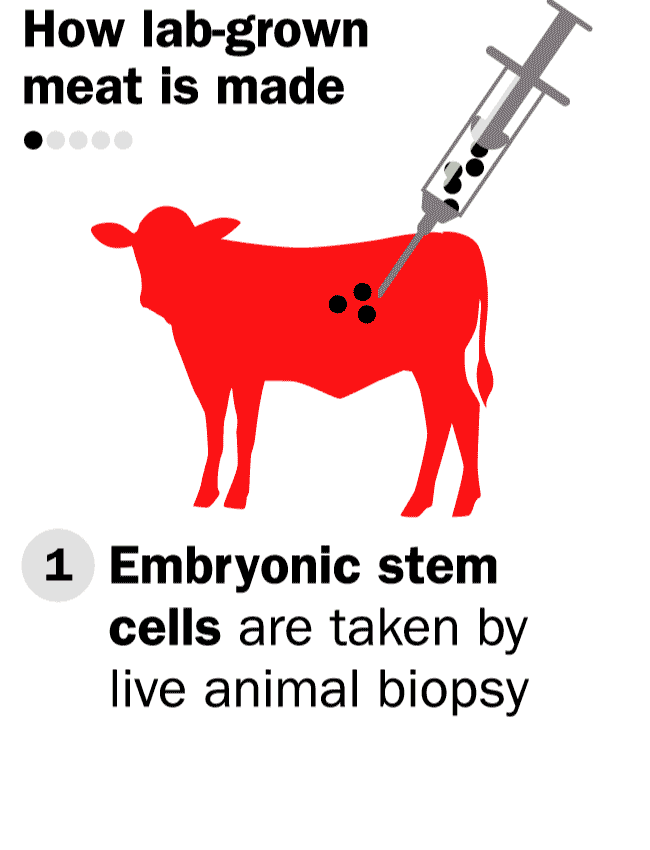
There is nothing quite like the sizzle of steak hitting a hot cast-iron skillet. First comes the heady aroma of caramelizing meat, followed by the smoke of charring fat. Juices splatter, and my mouth automatically starts to water in anticipation. Then my stomach clenches with guilt.
As a climate correspondent, I try to avoid beef. The global livestock industry is responsible for more than 14% of all man-made greenhouse-gas emissions in our atmosphere, nearly as much as road transport, aviation and shipping combined.
Industrial cattle farming is one of the biggest global sources of methane, a potent greenhouse gas that is 80 times more efficient at trapping heat in the short term than C02. Cultivating the crops to feed the cattle industry drives deforestation, generating even greater emissions. In order to lift our collective foot from the accelerator taking us to certain climate doom, the World Resources Institute, an environmental research organization, suggests that residents of the Americas, Europe, and Oceania limit their consumption of red meat to the equivalent of two burgers a week.
Israeli startup Aleph Farms says it would be better to eat steak. Its steak, that is—a rich slab of meat grown from stem cells, in a bioreactor, no cows or slaughter required. Its “cultivated meat,” which is the industry’s preferred term, is not yet available on the market—no cultivated meat product has passed regulatory approval outside of Singapore—but the company invited me to try its signature cut at its facility in Rehovot, half an hour south of Tel Aviv. There, company co-founder Didier Toubia promised me a taste of the future, in which a beautiful steak, seared to perfection, is no longer served on a bed of methane emissions with a side of biodiversity loss in Amazonian rainforests.
More from TIME
Read More: The Cow That Could Feed the Planet
Aleph Farms, like many of the more than 100 cultivated meat and fish companies founded over the past decade, starts with stem cells grown in a nutrient-broth-filled bioreactor. Each company has its own proprietary method for prodding those cells to differentiate into proteins or fats, which continue to grow until they clump into formations similar to ground meat, at which point they can be harvested and processed into burgers, sausages, or breaded nuggets. Aleph Farms doesn’t stop there. Instead the company adds a few more steps to create a structured steak with the texture and flavor of a filet mignon.
It would be easier to aim for a ground meat product, says Toubia, but that doesn’t resonate in the same way as a prime piece of steak. “We need to emotionally connect with consumers if we want to drive acceptance. Starting at the higher end is a way to position our product to make it more appealing.” Toubia invokes Tesla as an analogy—aiming for a premium offering by nailing the details. “They didn’t invent the electric vehicle; they were just the first to get it right.”
Getting steak right is one of the most difficult pieces of engineering for cultivated meat companies. Aleph Farms cracked the code by coaxing the meat, fat, and connective tissue cells to grow along a plant-based, nearly microscopic scaffolding that enables those cells to replicate the muscle fibers of conventionally grown meat. The combined tissues are then grown in a second nutrient broth for four weeks, at which point the ‘steak’ is approximately the size of a smartphone and ready to sear on the grill.

The company is now working on a second iteration that uses a 3D bioprinter (using living cells instead of ink) to combine their structured fibers with fat cells to create a thick, marbled steak—the “holy grail,” according to Toubia. They’ve made a few so far, he says, but not enough for tastings outside of the company.
Aleph’s focus on beef instead of chicken, which is easier to cultivate, and steak instead of ground meat puts it behind other alternative protein companies when it comes to the race to market. GOOD Meat, a division of the American food technology company Eat Just, Inc., is already selling its cultivated chicken in Singapore. Israel’s SuperMeat offers invite-only tastings at its stylish bistro-cum-laboratory where diners tuck into crispy chicken burgers and hot dogs against a backdrop of bioreactors busy producing the next batch.
Read More: Cultivated Meat Passes the Taste Test
In the next several months the U.S. Department of Agriculture is expected to rule on whether or not (and if so, how) cultivated meats can be sold in the country. Industry watchers say authorization is likely. Once sales are permitted in the U.S., other countries will soon follow, and companies from around the world will start bringing their cultivated meat products to market in what is likely to be the biggest meat revolution since the domestication of cattle. Aiming for higher (ahem) stakes may hinder Aleph’s advance to market, but Toubia shrugs off the competition, confident that slow and steady progress wins in the end. “First to market is not necessarily a benefit with new food categories. Our priority is impact, for the planet, and taste, for consumer acceptance.”
He may be on to something. My thin-cut steak, brushed with butter and seasoned simply with salt and pepper, hits the hot grill of Aleph’s demonstration kitchen with an audible hiss. The scent of seared meat wafts towards me as the in-house chef flips a credit-card sized portion onto my plate. The steak is disappointingly slim—I’ll have to come back another time for the thicker, 3D-printed version—but it is as tender and juicy as the interior of a filet mignon. As I cut into it, the meat tears into strands more characteristic of a brisket, but with none of the dryness. I take a bite. The flavor is pure meat—a caramelized crust giving way to a savory richness. The square shape and thin cut betray my steak’s bioreactor origins, but eyes closed, I wouldn’t know the difference. With my last bite, I realize Toubia was wrong. It doesn’t taste like the future. It tastes like steak. Without the guilt.
More Must-Reads from TIME
- Cybersecurity Experts Are Sounding the Alarm on DOGE
- Meet the 2025 Women of the Year
- The Harsh Truth About Disability Inclusion
- Why Do More Young Adults Have Cancer?
- Colman Domingo Leads With Radical Love
- How to Get Better at Doing Things Alone
- Michelle Zauner Stares Down the Darkness
Contact us at letters@time.com